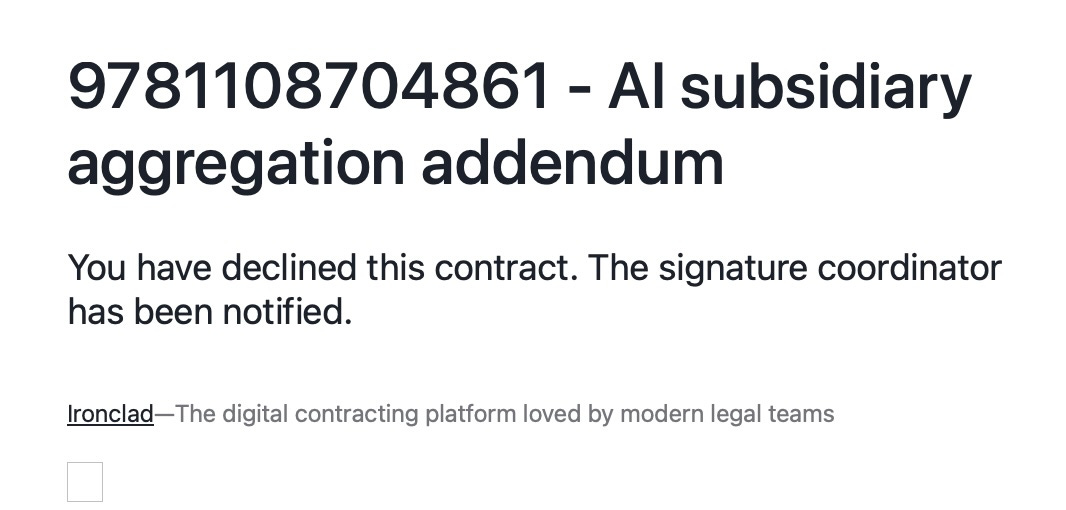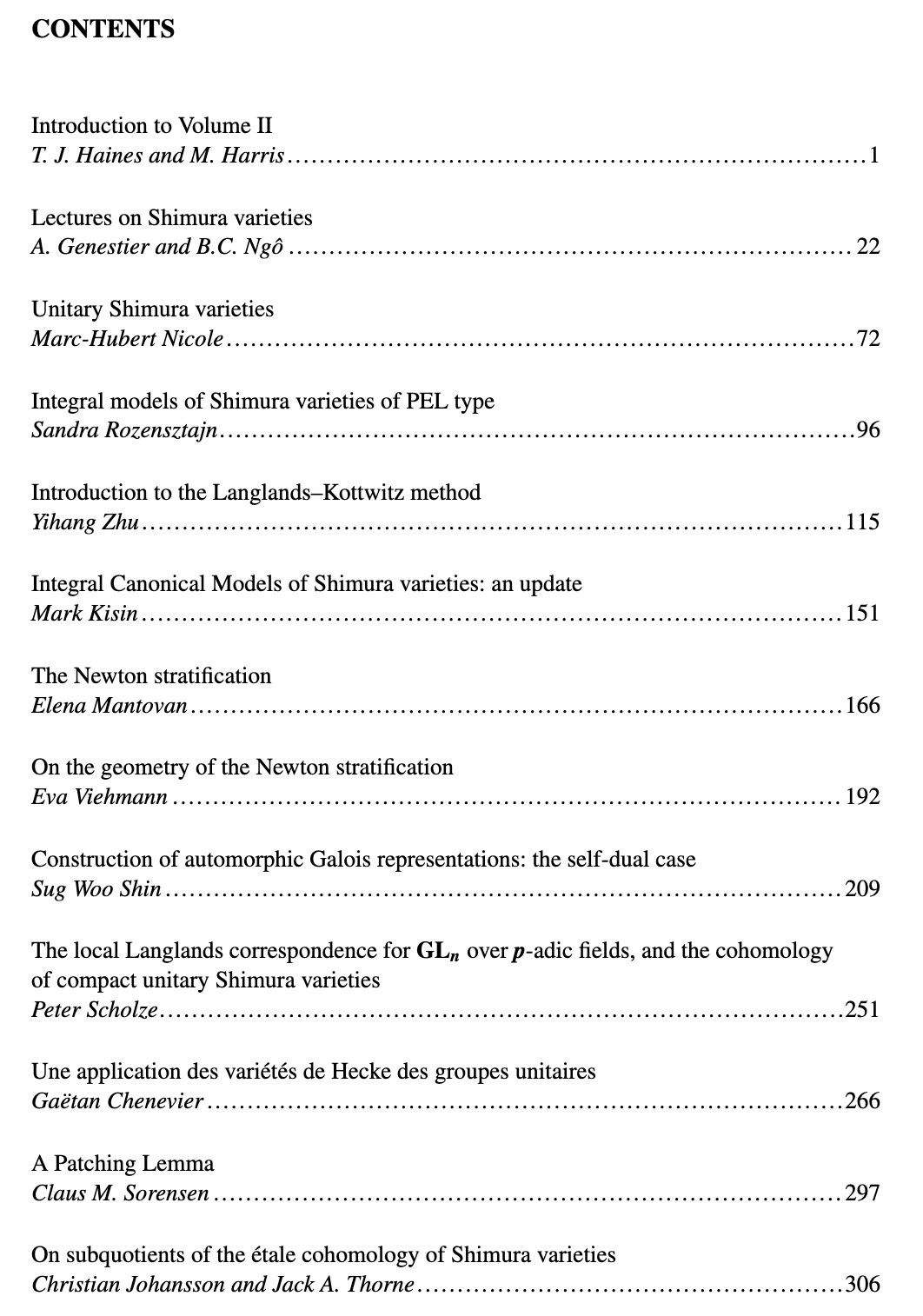UPDATE: Cambridge University Press now invites authors of math books to "opt in"
With reflections on contracts, confidentiality, and disclosure
UPDATE OF UPDATE: This came through today:
Also, I highly recommend this article by Graham Lovelace about authors who “felt betrayed” by the Taylor & Francis deal, and are asking “how and when royalties will be paid.”
A message identical to the one quoted in the previous post arrived in my inbox this morning (February 4, 2025) at 3:05 AM New York time, with the subject line
Your response required: Cambridge University Press, AI Subsidiary Aggregation Addendum
The invitation to “agree that your work should be included in generative AI licensing deals” concerned the book Shimura Varieties that I edited with Thomas Haines.
As you can see, Tom and I only wrote the first 21 pages. When we signed the contract in 2018 I was completely indifferent to questions of copyright, and didn’t even bother to read the contract; I don’t even remember seeing the potentially dangerous clause about my legal liability in various circumstances, for example if the Work contains “any libellous, obscene, unlawful or otherwise objectionable material.” All that mattered to me at the time was that all royalties1 would be assigned to the Fondation Sciences Mathématiques de Paris.
Digression on the title of The Work
I want to point out, to anyone paying attention, that the title was supposed to be
Stabilization of the trace formula, Shimura varieties, and arithmetic applications, Volume II: Shimura varieties.
That was the title that I included in my CV during the years before all the authors had submitted their contributions, and how it still appears on my home page. If I had actually read the contract Tom and I might have prevented the publishers from substituting the (admittedly snappier) current title, in order to draw potential readers’ attention to the existence of Volume I (coedited with Laurent Clozel, Jean-Pierre Labesse, and Bao-Châu Ngô) which, to my relief, I see is still available from the International Press website.
Here, for the record, is the copyright agreement:
ASSIGNMENT OF COPYRIGHT
The Editor hereby assigns to Cambridge with full title guarantee for the Term:
2.1.1 the full copyright in the Work in all forms and media and in all languages throughout the world, present and future (which, for the avoidance of doubt, includes the right to publish, reproduce, distribute, and sell the Work or any part thereof in any form, whether print, digital or electronic, whether now known or hereinafter invented; to create derivative works or sublicense others to do so; and to grant sublicences of all translation and subsidiary rights all on such terms as Cambridge shall determine); and
2.1.2 all other rights in the nature of copyright, including rental, lending and database rights and all other publishing, print on demand and intellectual property rights in the Work.
The Editor hereby asserts the Editor's moral right always to be identified as the editor of the Work in accordance with the provisions of the UK Copyright, Designs and Patents Act 1988.
Cambridge will enter into separate agreements with the Contributors.
I haven’t seen the separate agreements; I have been told that typically only the editors of a volume like this one, and not the Contributors, are paid royalties.
Item 10 of the contract, labelled SUBSIDIARY RIGHTS LEASING, seems to grant CUP the right to license the work as they please, provided they inform the Editor:
Cambridge shall use reasonable endeavours to commercially exploit the rights licensed hereunder by licensing the subsidiary rights in the Work to reputable third-parties.
The negotiation of and final agreement to terms of such commercial exploitation shall be in the sole control of Cambridge who shall not license any subsidiary rights in the Work without first notifying the Editor, (such notification shall not apply to any licensing by Cambridge of 'quotation and extract' and 'reprographic reproduction' subsidiary rights).
The wording is ambiguous enough to have allowed CUP to sign GenAI licensing agreements without doing more than “notifying” authors’. So I have to be grateful to CUP for their decision to invite us to choose whether or not to opt in to the generative AI licensing agreement.
Item 22, labeled CONFIDENTIALITY, suggests that I am on shaky grounds sharing excerpts of the contract with you —
The Editor undertakes that the Editor shall not at any time during this Agreement, and for a period of five years after its termination, disclose to any person any confidential information concerning the business, affairs, customers, clients or suppliers of Cambridge (including the terms of this Agreement, market research information, marketing and editorial plans for the Work and projected sales for the Work) except as permitted by Clause 22.2 below.
Whatever Clause 22.2 permits as exceptions (and you’ll have to ask someone else if you want to find out), a Substack newsletter is not one of them. I do not believe the contract includes the Disclaimer at the end of this morning’s e-mail from CUP, 6 1/2 years after the contract was signed:
Disclaimer
This email is intended solely for the recipient and may contain confidential information. If you have received this email in error, please let us know and then delete the original email and any attachments. Do not use, copy or disclose the contents of this email or any attachment. Any views or opinions in this email are solely those of the author and do not necessarily represent those of Cambridge, unless specifically stated.
Anyway, I didn’t copy the contents of this morning’s email in the previous post; they were the contents of an email to an author of a different CUP publication, not in the mathematics collection. On the other hand, it can be argued that I disclosed the contents by informing you that I received an identical email to one whose contents I had published a few days ago.
5% of net receipts, with some exceptions



Interesting. Now you read it. As an agent I advise my authors to read publishing agreements before signing them. I read over the proposed agreements and point out problematic clauses. I help the author negotiate In the case of Cambridge University Press and Vasek Chvatal's book on Paul Erdos's mathematics we successfully dealt with some of the questionable features Michael Harris points to in his posting. This was possible because the signing was competitive. Publishers can't be pushed very far you need leverage. Peter Renz